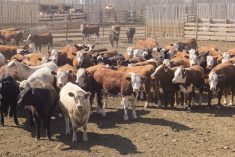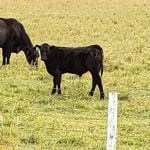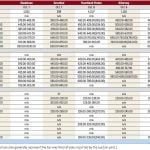Western Canadian feeder cattle prices were steady with week-ago levels as auction markets experienced larger volumes with more yearlings coming on stream. Major feeding operations shrugged off the E. coli media hype while the smaller feedlot background operator tended to shy away from the market.
Fed cattle prices remain under pressure and feedlot margins are struggling with higher barley prices; however, ideas of tighter beef supplies, longer-term, and stronger beef demand in the spring period were the main factors supporting feeder cattle prices.
In central Alberta, exotic steers weighing 450 pounds sold for $180 per hundredweight (cwt); black Angus steers weighing 620 lbs. were selling for $155/cwt in the same region. Exotic steers weighing 825 lbs. were quoted at $133/cwt landed in southern Alberta feedlot. Fed steers sold for $105-$107/cwt in Alberta.
Read Also

U.S. livestock: Feeder cattle hit contract highs on tight supply
Chicago | Reuters – All Chicago Mercantile Exchange feeder cattle futures and most live cattle futures hit contract highs on…
The U.S. market was very uneven. In Nebraska, medium-frame steers weighing 827 lbs. sold for $143/cwt. Fed cattle in the southern Plains were selling for $124/cwt, up $1 from a week earlier.
Cash barley prices reached $270 in southern Alberta last week; I was hearing of higher values in certain areas of Saskatchewan and Alberta. Statistics Canada estimated the barley crop at 8.6 million tonnes, down from earlier expectations of 9.5 million. Feedgrain prices in Western Canada are expected to trend higher through the winter and cattle feeders are factoring this into their formulas when purchasing replacement cattle.
Similar to last week, I expect the feeder market to trade sideways to lower over the next month. One thing we have learned from the past is that the market structure can change quite significantly within a short timeframe. I would encourage producers to sell parcels of cattle incrementally to diversify their marketing timetable. There is a negative market psychology in the short term which producers should avoid if possible.
— Jerry Klassen is a commodity market analyst in Winnipeg and maintains an interest in the family feedlot in southern Alberta. He writes an in-depth biweekly commentary, Canadian Feedlot and Cattle Market Analysis, for feedlot operators in Canada. He can be reached by email at [email protected] for questions or comments.















